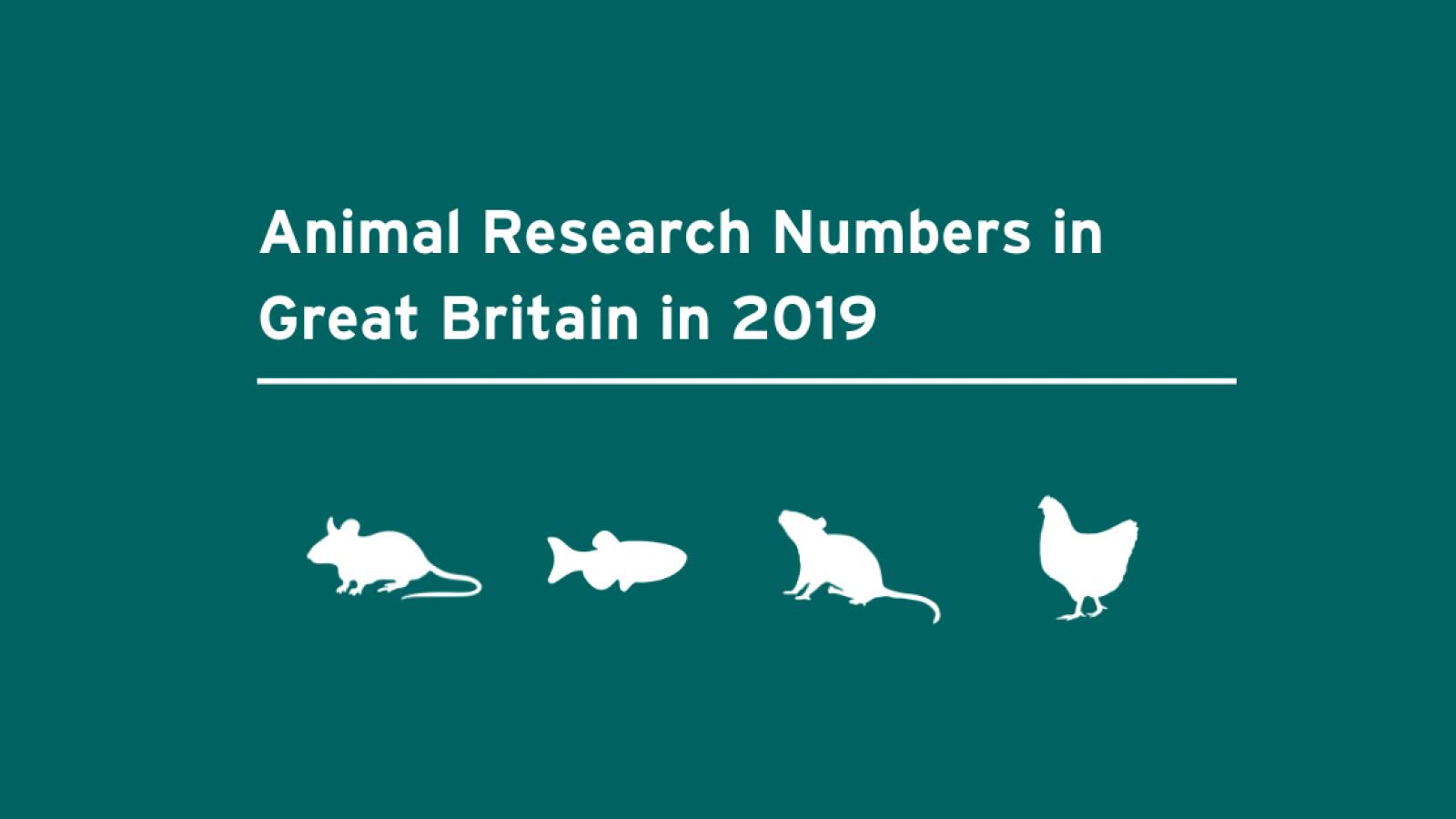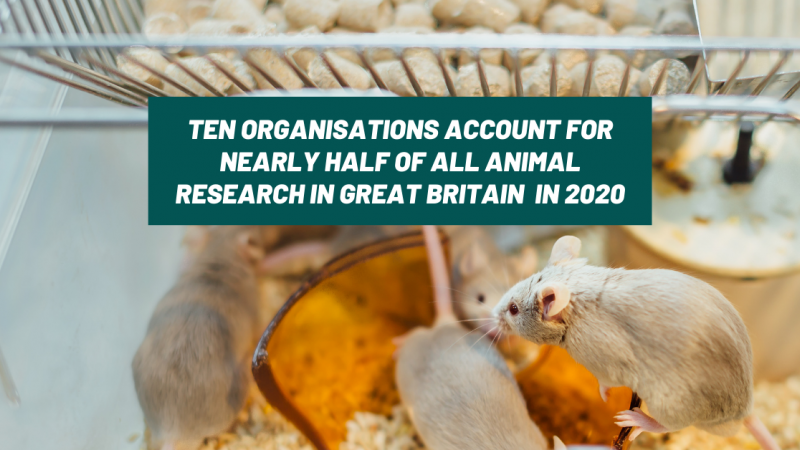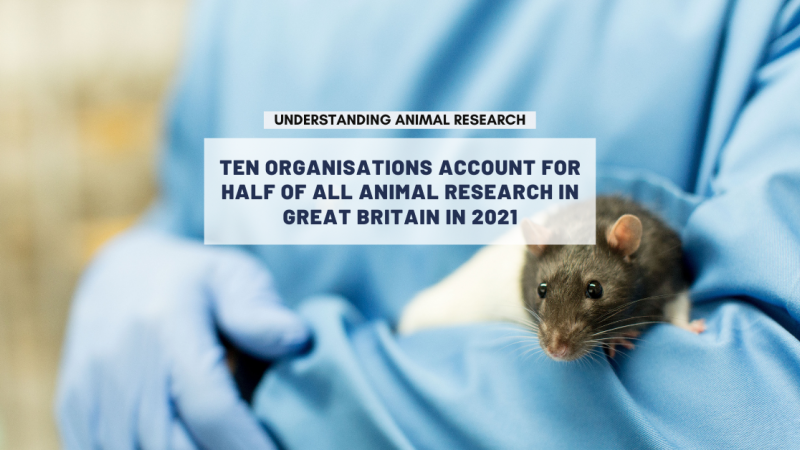Latest figures show fewer animals used in research in 2019
- Number of procedures on animals has decreased by 3% to 3.4 million
- Lowest number of procedures carried out in a single year since 2007
- Mice, fish, rats, and birds account for over 97% of all procedure
- Cats, dogs, and primates account for 0.2% of all procedures
Today (Thursday, 16 July 2020) the government has released its annual statistics on the number of animals used in scientific, medical and veterinary research in 2019. The figures show that 3,401,517 procedures were carried out in Great Britain in 2019, 3% fewer than in 2018.
Nearly half of these procedures were carried out by ten organisations.
Over 97% of procedures were carried out on mice, fish, rats and birds whereas cats, dogs and primates accounted for 0.2% of all procedures.
Number of Animal Procedures in Great Britain in 2019
| Species | Experimental Procedures | % | Procedures for the Creation & Breeding of Genetically Altered Animals | % | Total Procedures (2019) | % of total | % change from 2018 |
| Mice | 1,048,759 | 60.63% | 1,458,790 | 87.25% | 2,507,549 | 73.72% | -2.36% |
| Fish | 278,860 | 16.12% | 200,721 | 12.01% | 479,581 | 14.10% | -6.76% |
| Rats | 162,669 | 9.40% | 8,400 | 0.50% | 171,069 | 5.03% | -3.84% |
| Birds | 130,682 | 7.56% | 2,126 | 0.13% | 132,808 | 3.90% | -10.29% |
| Other mammals | 85,227 | 4.93% | 187 | 0.01% | 85,414 | 2.51% | +2.68% |
| Reptiles | 0 | 0.00% | 0 | 0.00% | 0 | 0.00% | -100.00% |
| Amphibians | 5,729 | 0.33% | 1,647 | 0.10% | 7,376 | 0.22% | -25.29% |
| Primates | 2,850 | 0.16% | 0 | 0.00% | 2,850 | 0.08% | -11.13% |
| Cats | 131 | 0.01% | 0 | 0.00% | 131 | 0.00% | -17.61% |
| Dogs | 4,227 | 0.24% | 0 | 0.00% | 4,227 | 0.12% | -5.67% |
| Horses | 10,512 | 0.61% | 0 | 0.00% | 10,512 | 0.31% | +0.84% |
| Total | 1,729,646 | 100% | 1,671,871 | 100% | 3,401,517 | 100% | -3.36% |
Half (1.67 million) all procedures were the creation or breeding of genetically altered (GA) animals. Of these 1.67 million procedures, 88.2% (1,474,523 procedures) were for the purpose of maintenance of established lines of genetically altered animals (not used in experimental procedures), while 11.8% (197,348 procedures) were for the creation of new lines of genetically altered animals (not used in experimental procedures).
The other half (1.73 million) of all procedures were for experimental purposes. This includes basic research, which expands our knowledge of living organisms and the environment; applied research, which addresses prevention of disease and development of treatments; and regulatory research, which includes studies aimed at ensuring product safety and the effectiveness of pharmaceuticals. Of these 1.73 million procedures, 56.9% (984,316 procedures) are for basic research, 25.3% (437,124 procedures) are for regulatory research, and 16% (277,303 procedures) are for applied research.
The use of animals to test tobacco products was banned in the UK in 1997 and it has been illegal to use animals to test cosmetic products in this country since 1998. A policy ban on household product testing using animals was introduced in 2010. Since 2013, it has been illegal to sell or import cosmetics anywhere in the EU where the finished product or its ingredients have been tested on animals.
Severity of Animal Procedures in Great Britain in 2019
| Severity | Experimental Procedures | % | Procedures for the Creation & Breeding of Genetically Altered Animals | % | Total Procedures (2019) | % | Change from 2018 |
| Sub threshold | 195,207 | 11.29% | 1,237,260 | 74.00% | 1,432,467 | 42.11% | ↑ |
| Non-recovery | 85,106 | 4.92% | 1,120 | 0.07% | 86,226 | 2.53% | ↓ |
| Mild | 897,498 | 51.89% | 354,815 | 21.22% | 1,252,313 | 36.82% | ↓ |
| Moderate | 479,058 | 27.70% | 45,611 | 2.73% | 524,669 | 15.42% | ↑ |
| Severe | 72,777 | 4.21% | 33,065 | 1.98% | 105,842 | 3.11% | ↓ |
| Total | 1,729,646 | 100.00% | 1,671,871 | 100.00% | 3,401,517 | 100.00% |
Severity assessments measure the harm experienced by an animal during a procedure. A procedure can be as mild as an injection, or as severe as an organ transplant, and the severity assessments reflect the peak severity of the entire procedure.
Sub-threshold is when a procedure did not cause suffering above the threshold for regulation. Non-recovery is when the entire procedure takes place under general anaesthetic and there is no recovery. Mild is the equivalent of an injection or having a blood sample taken. Moderate includes surgery under anaesthesia followed by painkillers during recovery. Severe suffering is when a procedure causes a major departure from the animal's usual state of health and well-being. Animals found dead are commonly classified as severe as pre-mortality suffering often cannot be assessed. Most severe procedures arise in regulatory testing such as evaluation of the toxicity of drugs.
The proportion of animal research categorised as sub-threshold rose from 40.2% in 2018 to 42.1% in 2019. The proportion of procedures categorised as severe decreased from 3.6% in 2018 to 3.1% in 2019. Animals are used alongside other techniques such as cell cultures, human studies and computational models. These methods are used – often in tandem – to answer the key biological questions necessary to understand and treat disease.
Animal research is strictly regulated in the UK. Every procedure, from a simple blood test to major surgery, requires individual, establishment and project licences, as well as approval from an Animal Welfare and Ethical Review Body. Before an animal is used, researchers must show that the knowledge could not be acquired using non-animal methods.
While the government produces these statistics on an annual basis, more organisations than ever before are openly publishing their own figures on their websites. This move towards greater transparency has been bolstered by the Concordat on Openness on Animal Research in the UK, which has been signed by 124 organisations since it launched in 2014.
Last edited: 5 July 2022 13:46







